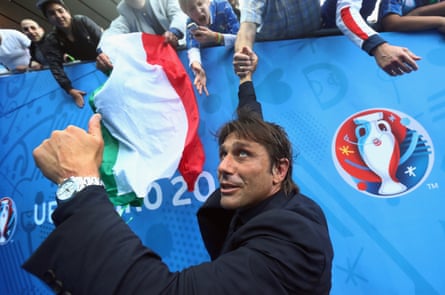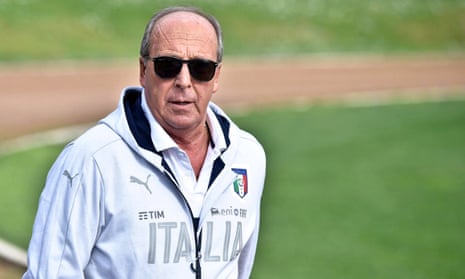Two hours of football in Berlin’s Olympiastadion were not enough to separate Italy and France in the 2006 World Cup final. In the resultant penalty shoot-out, Italian defender Fabio Grosso stepped up to take his kick with the dreams of a nation in his left boot. He confidently converted his penalty, floating the ball into the top-right corner as Fabien Barthez dived the other way. Italy were champions of the world and there was pandemonium at the Piazza Venezia back in Rome as Italians celebrated winning their fourth World Cup.
The shadow of the Calciopoli scandal loomed large over Italian football at the time, but the Azzurri could not have done a better job alleviating the embarrassment of the scandal that rocked their domestic game. Throughout the tournament, the Italians – led by Ballon d’Or winning captain Fabio Cannavaro – had pulled together and, when necessary, deployed their famed Catenaccio tactics. Their “door-bolt football” limited opponents to only two goals in seven matches – and one of those was an own goal and the other was a penalty.
The hope was that this Italy side, with their experience, cunning and skill, would continue to prevail in years to come. Three days after lifting the World Cup, however, Marcello Lippi elected not to renew his contract. The Italian football federation gave former Milan legend Roberto Donadoni the job and asked him to prepare the team for Euro 2008 in Austria and Switzerland.
With many World Cup winners still in the team, Italians were positive about their chances going into the opening match of Euro 2008 against Holland. They suffered a humbling 4-1 defeat to Marco van Basten’s team and went out at the first knock-out stage after losing on penalties to Spain. Spain’s golden era had begun and Italy had been halted in their tracks. Donadoni’s consequent dismissal prompted the federation to re-appoint Lippi, who was given the near impossible job of following up his 2006 masterpiece at the 2010 World Cup in South Africa.
Rather than invigorating the squad with fresh faces, Lippi remained faithful to the old guard. His logic made some sense but four years can be an eternity in football. Placing such enormous responsibility and expectation on ageing stars, such as the 36-year-old Cannavaro, didn’t work. Dismal performances against Paraguay, Slovakia and New Zealand forced a reality check. Italy didn’t win a game, finished last in a winnable group and went crashing out.
The national team had embarrassed themselves in South Africa and Serie A was not in a great state either. Italy’s most prestigious clubs had lost ground on their European counterparts. Juventus were still struggling after Calciopoli, though it wouldn’t be long until their emphatic revival began. Milan’s troubles after their Scudetto in 2011 forced an exodus of major stars. Inter had won the European Cup (without an Italian in the starting line-up) but they failed to build on the success of José Mourinho’s glorious treble-winning season; like the national team, Inter kept faith in the old guard for too long. Meanwhile, Napoli and Roma failed to make the step up in European competition.
After the debacle in South Africa, it took two years for shoots of revival to appear. Coached by former Fiorentina boss, Cesare Prandelli, Italy enjoyed a run to the final of Euro 2012, beating England and Germany along the way. The young and often misunderstood star striker, Mario Balotelli, tormented Joachim Löw’s Germany team, scoring two goals and flexing his muscles (literally) for the world to see. Balotelli’s exploits in his first major tournament breathed new life into the Azzurri. To their dismay, Italy once again ran into Spain, and were comfortably beaten in the final. But there was no doubting that the national side had progressed under Prandelli.
A year later, there was further cause for optimism at the Uefa U21 European Championship in Israel. Inspired by coach Devis Mangia, a talented group containing Lorenzo Insigne, Ciro Immobile, Alessandro Florenzi, Manolo Gabbiadini and one of the world’s best midfield technicians, Marco Verratti, made it to the final. But, once again, they were beaten by Spain.
By the time the 2014 World Cup arrived, Italy appeared to be on the right track. Prandelli brought rising stars such as Verratti, Insigne and Immobile into the squad, while still keeping his faith in elder statesmen Gianluigi Buffon and Daniele De Rossi. Expectations before the tournament were predictably mixed. Hearts were set on a renaissance but minds forecasted further heartache. These doubts were temporarily vanquished after a 2-1 victory over England in their opening game but, just like four year before, the wheels fell off against the teams they had expected to beat. Italy lost to Costa Rica and Uruguay without scoring a goal in either game. Consecutive group stage exits provoked plenty of soul searching and, once again, a change of coach.
Prandelli resigned and in stepped Antonio Conte, the coach who had masterminded Juve’s return to the summit of Italian football, winning three consecutive league titles. Recognised around Europe as a meticulous man-manager, Conte’s tactical insight was exactly what Italy needed. The fiery and irrepressible winner changed the landscape of the team.
Although the talent in his squad for Euro 2016 was questioned at every turn, Conte was not perturbed. He wanted 23 warriors who would suffer for one another and that’s exactly what he selected. The squad embraced his philosophy, including the inexperienced Emanuele Giaccherini, Federico Bernardeschi and Mattia De Sciglio. After cathartic victories against Belgium and most significantly, Spain, Italy’s spirited efforts fell short in the quarter-finals, where they lost to world champions Germany on penalties. But Conte’s men won considerable praise and, perhaps more importantly, restored Italian pride.

Conte left the national team for Chelsea but, for the first time in a while, fans felt there was a new vision and purpose. The federation brought in 69-year-old journeyman Gian Piero Ventura, who has led clubs at every level in Italy in his 41 years as a coach. Ventura had become part of the fabric in Italy but, from a philosophical perspective, he is one of the most forward-thinking Azzurri coaches in recent memory. Unlike Conte, who tended to shy away from placing faith in young players, Ventura imagines an Italy side full of starlets.
Italy face Albania in a World Cup qualifier on Friday night and Ventura’s squad contains a few new faces. Bologna winger Simone Verdi (24), Atalanta defender Leonardo Spinazzola (23), Inter defender Danilo D’Ambrosio (28) and goalkeeper Alex Meret (20), who plays for Serie B side Spal, have all been included for the first time. On top of that, Inter midfielder Roberto Gagliardini (22) and Sassuolo winger Matteo Politano (23) could also make their debuts, having been unused substitutes in previous matches.
Ventura believes that Italy must commit to a project to compete with Germany, Portugal, Spain and France – and his project is the integration of young players to the team. The average age of Italy’s squad at Euro 2016 was 29. That has fallen under Ventura, who does not select players based on experience and reputation but on what they can provide now and in the future. Personal favourites of Conte, such as Giaccherini and Graziano Pellè, have been cast aside.
Of course, Ventura has not abandoned the most dependable members of the old guard, and he would be foolish to do so. Few nations have enjoyed the luxury of having a keeper like Buffon in goal. Having spent 20 years as Italy’s No1, the Juve captain remains the face of the national team and continues to be an example for all, including his heir – Milan’s 18-year-old keeper Gianluigi Donnarumma.
Defensively, the Juventus trio of Bonucci, Barzagli and Chiellini has proven highly dependable for Italy but their window of opportunity to achieve national glory is closing. The future also looks bright in the defensive positions. Combining a unique mixture of technical ability and solidity, Alessio Romagnoli, Daniele Rugani and Mattia Caldara – all 22 years of age – are ready to step in. In midfield, Verratti should be able to fill Andrea Pirlo’s role in the front of the defence for the next decade, while Gagliardini has risen rapidly at Inter.
Finally, after years of uncertainty in the attacking positions, the Azzurri look to have found the answers. Andrea “the Rooster” Belotti was largely unknown before this season but his form with Torino has ensured he now holds a €100m release clause in his contract. Flanking the 24-year old striker are the likes of Insigne, Bernardeschi and Sassuolo’s tenacious winger Domenico Berardi.
The success of a national team is related to its domestic product and Italian football has recently altered its thinking towards developing young players. In the past, there were few clubs making a conscious effort to incorporate homegrown talents, opting instead to spend money on foreign talent. Clubs such as Sassuolo, Sampdoria and Atalanta are now organised around the idea of promoting youth-team players rather than shipping them out on loan. This way of thinking is revolutionising Serie A and Serie B, which is no longer consider it a wasteland, but rather a place to earn significant playing experience.
In the build up to the Albania match, Ventura spoke about the importance of youth. “I’ve said for some time that there’s a lot of good young players within the national team set-up. To qualify, we need some youth. [Alex] Meret’s selection is designed to give a signal of continuity, to demonstrate that those in the Under-21s should be aiming to reach the senior side through their performances.”
Slowly but surely, fresh faces and new methods are reforming an Italian national side that looks to have potential. With this injection of youthful creativity, the glory days may be rediscovered by the new generation. As the World Cup in Russia approaches, a sleeping giant has seen the light and is ready to step out of the shadows once again.

Comments (…)
Sign in or create your Guardian account to join the discussion